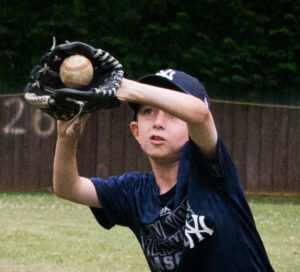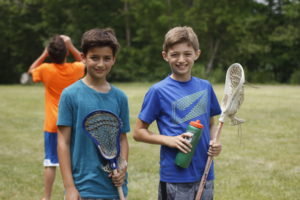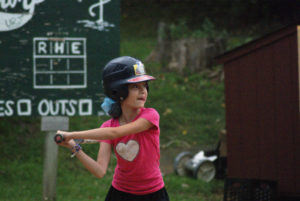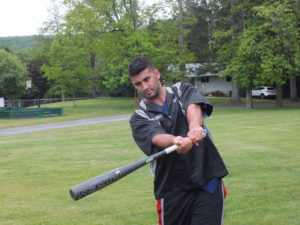by Jake Rudolph, Baseball Coach
Whenever friends, family members, or acquaintances ask me why I have gone back to the same sleep away camp every summer for ten years straight, I always respond with “because it’s a part of me”. Without camp I would never have made friends who will be standing next to me at my future wedding and I at theirs; I never would have had the chance to complete a ropes course program that taught me how to be fearless and work intricately with a team; who knows if I would have had the opportunity to sing a John Mayer song in front of an audience or perform in camps rendition of High School Musical; if it weren’t for camp, I may have never tried baseball: my all time favorite sport that I now get to coach during the summer.
This past fall, I took a Sports in Society sociology class because it fulfilled a related content area in my pursuit for a double major in Communications and Political Science. With my love for sports and experience as a veteran CLC athlete, the subject seemed right up my ally as the class touched upon sports policy, norms, economics, and a variety of other aspects that go into a functioning society. However, out of all of the units we studied, I felt my coaching instincts kick in as the majority of my interest was focused on a chapter titled Children in Sports. The information it contained was rich in theory, focusing on assumptions and studies about how the structures of childhood sports effect childhood development.  Specifically, Ben Bloom, educational Psychologist from the University of Chicago, studied 120 talented individuals simply to figure out what makes them so talented. His conclusions indicated that talent development came from a child’s ability to explore, play, and express themselves in a fun way, rather than learn from structured organizations, specializing in only one sport, or by getting motivation from committing to long-term goals – which did not effectively promote talent development. Bloom also specified that opportunities to freely and playfully explore an activity while discovering that it required creativity and effort, contribute to positive development as well. He concluded by claiming that talent development depends on a child’s level of emotional attachment with an activity, ability to call it their own, and identification of skills they want to master. Basically, the more freedom children have to explore a sport, instrument, game, hobby, etc., the more likely they are to naturally develop their own skills.
Specifically, Ben Bloom, educational Psychologist from the University of Chicago, studied 120 talented individuals simply to figure out what makes them so talented. His conclusions indicated that talent development came from a child’s ability to explore, play, and express themselves in a fun way, rather than learn from structured organizations, specializing in only one sport, or by getting motivation from committing to long-term goals – which did not effectively promote talent development. Bloom also specified that opportunities to freely and playfully explore an activity while discovering that it required creativity and effort, contribute to positive development as well. He concluded by claiming that talent development depends on a child’s level of emotional attachment with an activity, ability to call it their own, and identification of skills they want to master. Basically, the more freedom children have to explore a sport, instrument, game, hobby, etc., the more likely they are to naturally develop their own skills.
As an aspiring professor in Communications or Political Science, social research is my niche and learning about Bloom’s study triggered my intuition bringing me back to a day last summer when sports staff had some fun by doing a “Sports-Swap Day” in which coaches would teach one another’s sports. As one of camp’s baseball coaches, it was only fitting that lacrosse was the sport I had to cover for the day. For readers who don’t know, and just a quick fun fact about inter-sport relationships: baseball and lacrosse became rivals in the past couple of ye ars because the argument of “my sport is harder to play than yours” caused a weakly tied feud that triggers innocent competition between both types of athletes. Although I would love to go into detail about exactly how lacrosse is way less challenging to play than baseball for a variety of reasons, I actually had no idea how to teach a lacrosse lesson so I decided to give the kids free play for the period.
ars because the argument of “my sport is harder to play than yours” caused a weakly tied feud that triggers innocent competition between both types of athletes. Although I would love to go into detail about exactly how lacrosse is way less challenging to play than baseball for a variety of reasons, I actually had no idea how to teach a lacrosse lesson so I decided to give the kids free play for the period.
Some campers passed a ball around and others hung out in the shade appreciating a moment of relaxation. I knew even before reading Bloom that giving the kids the option to twist and turn in whichever direction they chose would definitely be a blessing they would greatly appreciate. Additionally, allowing for free time allowed me to better meet and connect with the group while also showing me a different angle of camp life that was away from baseball. There was something unique about this break in the camp routine that really made the day special and, reflecting on Bloom’s study, I realized it was the fact that I was seeing campers make their own choices in an environment where they could do whatever they wanted in a given situation.
The kids and I were given freedom – the best possible option for creativity – and, although we mostly conversed, we made that moment special. Maybe my perspective is different than theirs, but I truly believe that I was able to connect an incredible group of campers in a way that I never would have been able to had there not been a sports staff swap. However, I then realized that moments like these happen all of the time at camp. Specifically, I remember a pair of campers playing baseball with each other during Saturday morning Shabbat Free Play. They would take turns throwing up a baseball, hitting it in the air, and fielding the ball to get the batter out. For those of you who know how the game of baseball works, you understand how ridiculous the concept of one-on-one baseball is. For those who don’t, I encourage you to look up some online clips and you’ll understand why you can’t efficiently play baseball with two people, however rules and logic are irrelevant in this case. That morning I saw determination, skill, and hard work in a fantastically disorganized fiasco that occupied two campers for hours on end. Although I had to save my co-coaches from getting hit in the head by an 11-year-old fastball a couple of times, the kids had a blast and unknowingly created and played a version of baseball that adults might criticize for being too unstructured. While camp does an excellent job of teaching specific athletic skills, sometimes it’s this randomness that creates the most growth.
Specifically, I remember a pair of campers playing baseball with each other during Saturday morning Shabbat Free Play. They would take turns throwing up a baseball, hitting it in the air, and fielding the ball to get the batter out. For those of you who know how the game of baseball works, you understand how ridiculous the concept of one-on-one baseball is. For those who don’t, I encourage you to look up some online clips and you’ll understand why you can’t efficiently play baseball with two people, however rules and logic are irrelevant in this case. That morning I saw determination, skill, and hard work in a fantastically disorganized fiasco that occupied two campers for hours on end. Although I had to save my co-coaches from getting hit in the head by an 11-year-old fastball a couple of times, the kids had a blast and unknowingly created and played a version of baseball that adults might criticize for being too unstructured. While camp does an excellent job of teaching specific athletic skills, sometimes it’s this randomness that creates the most growth.
Both instances reminded me of being a camper: the blissful occasions when my bunkmates and I were able to utilize our free time to play roofball, soccer, have a catch with a baseball, or go for runs. They reminded me of times when my counselors would play with us and act more like older brothers and sisters than a force of authority. They reminded me of times when you reflect upon camp memories and appreciate exactly how special of a place camp is, that the minutes are limited, and that camp really is a second home. The two periods that I coached lacrosse reminded me of the true essence of Crane Lake: making the best of any situation no matter what. Ben Bloom even unknowingly studied this concept by showing how creativity, the ability to play a game and call it your own, and uniquely expressing yourself leads to positive childhood development; all which would not be possible without letting the kids make the best of diverse situations in the way they want to do it. Camp is inherently designed to give all campers options and opportunities to find themselves and I’m beyond honored to have the opportunity to further influence their creativity. This summer, it will be my goal to recreate moments like Sports-Swap-Day and one-on-one baseball because moments like those are camp. Moments like those build foundations for intuition, imagination, and passion.
Jake Rudolph will be spending his eleventh summer at Crane Lake this summer, his third year as a Baseball Coach. He is from Trumbull, Connecticut and attends the University of Connecticut (UConn) studying Communication and Sociology. There, he is a member of the HorseLincoln Improvisational comedy troop, Sigma Phi Epsilon’s member development, recruitment, communications, and programming committees, and serves as a campus tour guide.

